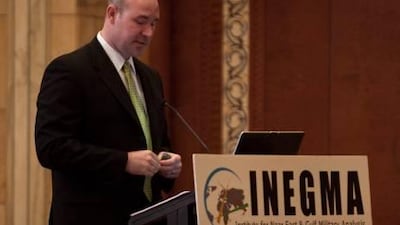ABU DHABI // Customs officials are receiving training from the US to better regulate the flow of seemingly innocent looking goods that can be used for illegal means.
Abu Dhabi, Dubai and, most recently, Ras Al Khaimah, have participated in the programme to learn to better identify such items known as dual-use goods.
They can be as commonplace as valves and are legal to trade, but can also be diverted for illicit means such as building nuclear weapons. The training is being given by the US State Department's Export Control and Related Border Security programme (EXBS), which also assists about 40 other countries. The UAE is involved as part of its years-long effort to bring its border, airport and seaport security up to international standards.
Among their other tasks, customs officials must learn to spot hundreds of the most sensitive types of machines or parts of machines that might be used to illegal ends. Comprehensive lists of dual-use items extend into the thousands.
They include anything from freeze dryers to accelerometers, which are used in smartphones and airbags but can also be used to test missiles.
"Dual-use components are traded legally every day. They don't look like a traditional weapon or contraband," said Tyler Hoffman, the EXBS regional adviser, speaking at a border security conference held in the capital yesterday.
"The shape and characteristics of guns and drugs has not changed in the past 40 years. Customs and law enforcement agencies spend decades training their officers to recognise these items," he said.
"The challenge with dual-use items is that they change as technology changes, making their identification that much more difficult."
Another challenge is that, as governments increasingly crack down, proliferators have responded by breaking down their shipments of dual-use equipment into even more basic components, making them less likely to raise red flags.
They might send the items through a variety of destinations over several months or even years.
The flow of such goods raises particular concern in the UAE because of its high volume of trade with Iran, which is accused by the international community of trying to develop nuclear weapons.
In an effort to monitor dual-use goods more closely, a law was passed in 2007 that expanded the list of sensitive items whose trade must be regulated, making it one of a handful of nations outside the US and Europe to do so and the first in the Middle East.
The law required traders in the UAE wishing to sell dual-use items to first obtain a licence. Officials are still working to ensure that all firms are aware they must fulfil this paperwork requirement.
Another concern for the UAE and other countries, however, is that measures imposed to prevent proliferation do not significantly slow trade. Rather than checking every container of cargo, for example, inspectors may target particular shipments that have raised suspicion.
"In today's fast-paced business environment, every movement and every second counts," said the Foreign Trade Minister Sheikha Lubna Al Qasimi at the conference yesterday.
Seaports and airports play a valuable role in foreign trade, which in turn makes up the bulk of the UAE economy, she said. Both types of ports accommodated more than Dh654billion in trade last year. And their key was their efficiency, she said.
"Security is one particular area that we have to focus more on in light of the recent regional and global developments," she said. At the same time, she added, policies are needed to "help drive businesses, not complicate them".
"There should be a balance between control and allowing the process to be flexible," she said.

